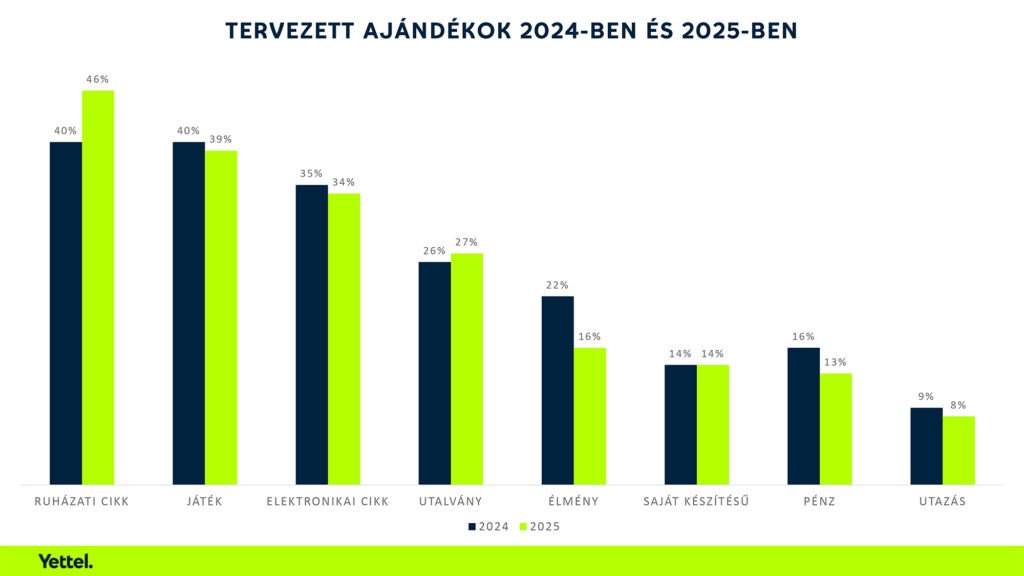The growing trend has been broken: Hungarians plan to spend the same amount on Christmas this year as last year
This year, Hungarians are expected to spend the same amount at Christmas compared to last year, according to a recent, national, representative study. According to the results, the proportion of those planning to spend more has decreased, and the number of people receiving gifts and celebrating with their extended family has also narrowed. Practicality has become more important, as while the most popular product categories continue to be clothes, toys and electronics, the popularity of experience gifts has declined compared to previous years.
This year, Yettel conducted its national representative study for the sixth time, in which it examined the Christmas communication and gift-giving habits of Hungarians. Compared to the previous year, fewer people plan to spend Christmas with their extended family and relatives; while slightly more people said that they celebrate with a smaller family circle. The number of people planning to spend Christmas alone this year has also increased slightly. Those with whom respondents do not meet in person during the holidays are mainly kept in touch by mobile phone calls or text chat applications.

This is how we are spending this year
Half of Hungarians have already started or are planning to buy gifts in November, and a third are planning to do so in the first half of December. The increasing trend in the budget for gifts that has been going on for the past five years has been broken: when asked how much money their family will spend on Christmas gifts this year, respondents gave an average of 75 thousand forints, which is below last year’s 77 thousand in real terms. The proportion of those planning to spend more has decreased, in addition, 45% of families plan to spend less than 50 thousand forints, and only two out of ten respondents will exceed the amount of 100 thousand forints. Furthermore, the proportion of those who do not plan to buy a gift at all has increased compared to last year. According to their own admission, they either never buy Christmas gifts (33%) or decided to do so due to their changed financial situation (25%).
The average number of people they plan to give gifts to has also decreased, from 5.8 last year to 5.4: although fewer people are giving gifts to their partners or parents, they are planning to give gifts to children and grandchildren in greater proportion. Those under 30 and women are expected to give gifts to more people than older people or men. Respondents most often surprise their partners or spouses (59%), followed by children (55%) and parents (48%). Compared to last year’s results, fewer people are giving gifts to more distant relatives this year, but a fifth of those celebrating also plan to surprise their friends.
More practical gifts come to the fore
The most popular product categories have not changed compared to previous years: most people continue to surprise their loved ones with clothing (46%), toys (39%) and electronics (34%). According to the Central Statistical Office, these product categories have increased in price this year, albeit at a lower rate than inflation, meaning that fewer gifts will be spent on Christmas gifts than last year. The survey data suggests that practical considerations have become more important, as more people are now buying clothes (46% instead of 40%), while fewer people are spending on experience gifts (16% instead of 22%). The most popular electronic items are headphones/earphones (27%) and smartphones (27%), followed by smartwatches (23%), game consoles and related games (19%), and phone protection accessories (19%).
When buying a gift, the most important criteria are that it is personalized (58%), useful (47%) and reasonably priced (35%). Compared to last year, the importance of choosing a unique (23% instead of 17%) and sustainable (10% instead of 6%) gift has increased – the latter is especially important for the 18-29 age group. Interestingly, on the one hand, the majority of respondents (56%) prefer to receive a surprise rather than a pre-arranged gift, and on the other hand, they are more happy if they know in advance what the recipient would like to receive (55%).
This is how we save on surprises – if we choose well, we can save the price of an entire Christmas during the year
The survey also explored the question of what difficulties Hungarians encounter during festive preparations. For four out of ten respondents, choosing the right gift is the biggest problem, and for three out of ten, Christmas-related expenses. In addition, a fifth of respondents find it difficult to stick to the previously planned budget. Women and those in their thirties are also more likely to experience a disruption due to the fact that they have little time to prepare for the holiday.
Related news
Hungarians don’t replace their furniture – JYSK research reveals a conscious, long-term planning market
🎧 Hallgasd a cikket: Lejátszás Szünet Folytatás Leállítás Nyelv: Auto…
Read more >Related news
Nestlé to sell remaining ice-cream assets but commits to Froneri venture
🎧 Hallgasd a cikket: Lejátszás Szünet Folytatás Leállítás Nyelv: Auto…
Read more >Lidl guarantees fairer prices for cocoa farmers
🎧 Hallgasd a cikket: Lejátszás Szünet Folytatás Leállítás Nyelv: Auto…
Read more >








